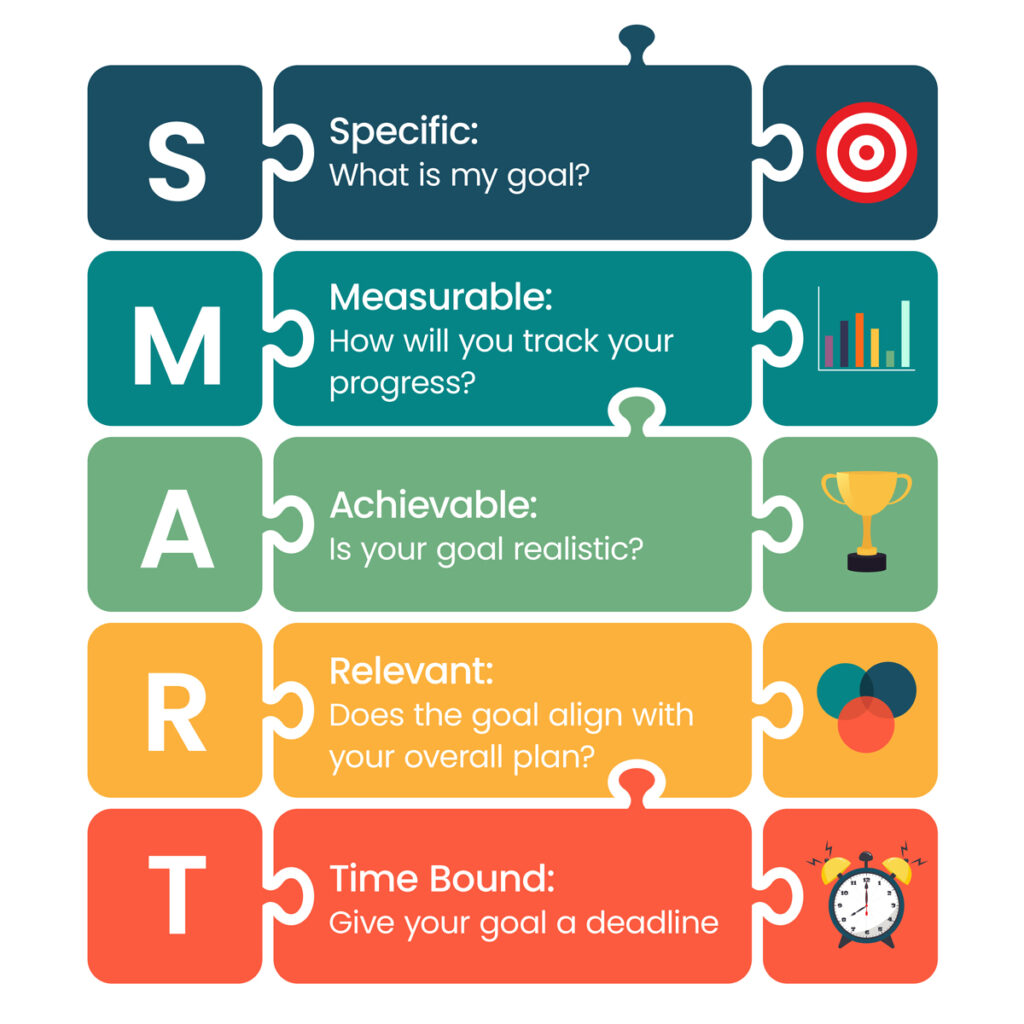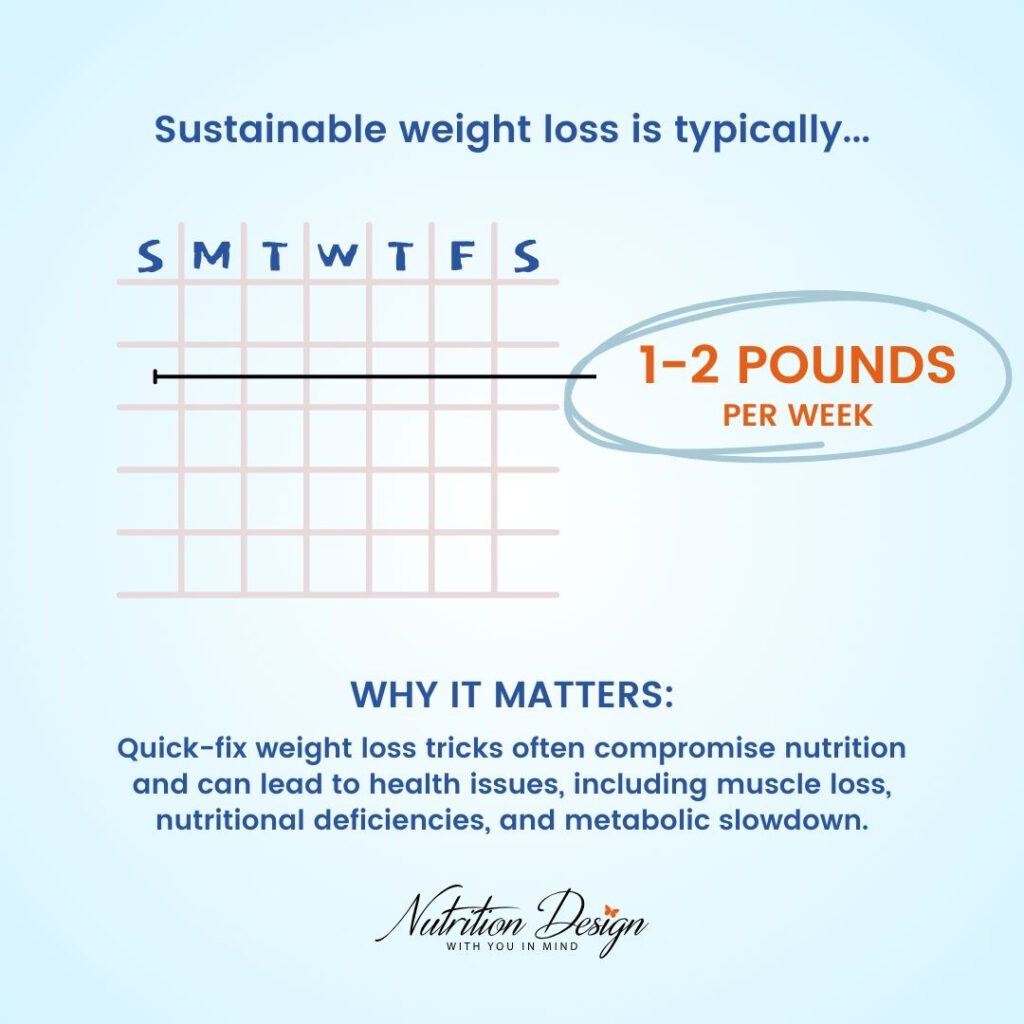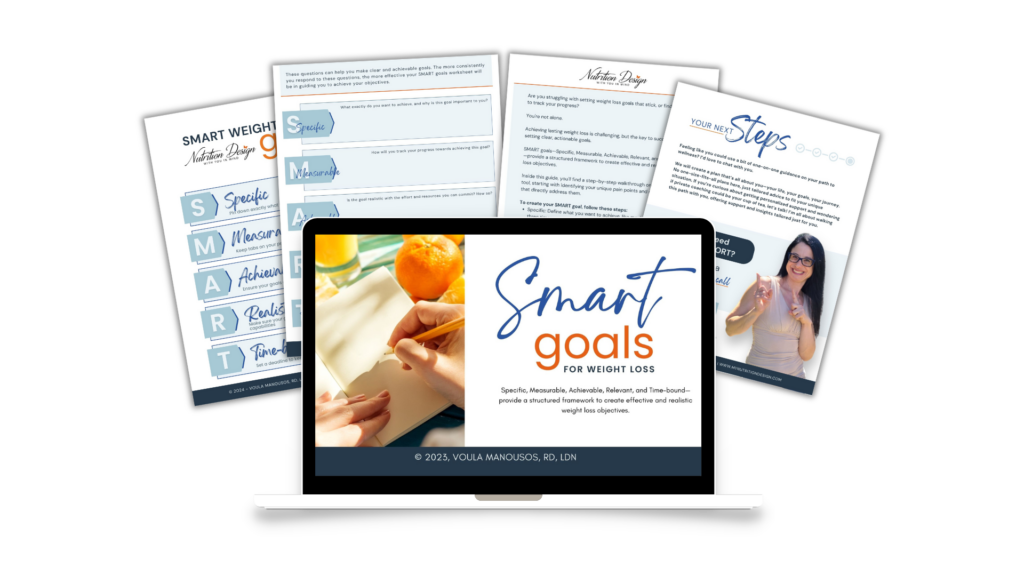Have you ever wondered what weight loss goals could look like if they were actually fun and motivating? Setting weight loss goals the smart way can make all the difference in your overall well-being and happiness – not to mention they can make losing weight a lot more achievable and sustainable.
In this blog, you will learn how to find that sweet spot for setting goals where losing weight feels good because it’s all about you, your health, and enjoying the journey.
Ready to get started?
Setting Weight Loss Goals That Nourish Body and Mind
When it comes to health and wellness, it’s common to focus just on losing weight which can lead to disordered eating and a disconnection from our bodies.
As a dietitian, I believe it’s more important to understand why we eat the way we do, rather than just focusing on what or how much we eat. The underlying emotional and psychological triggers behind our eating patterns matter as well.
By understanding the reasons behind our eating habits, we can aim for goals that truly benefit our overall health while supporting our goals for weight loss.

Mindfulness and SMART Goals
Mindfulness in eating means tuning into why we eat, beyond just hunger—recognizing emotions or habits driving our food choices. When you’re setting SMART goals for weight loss, your focus is on a behavioral goal and lifestyle changes rather than solely fixating on the number on the scale.
The goal-setting and weight loss process doesn’t have to feel like a punishment. Regardless of how much weight you want to lose, when you are mindful and your goals focus on sustainable healthy habits like meal planning and physical activity, your weight loss journey can be rewarding and enjoyable.
Mindful eating allows us to address what truly fuels our eating, leading to healthier habits. Integrating SMART goals—specific, measurable, achievable, relevant, and time-bound—offers a clear framework for these changes.
For a free SMART Goals for Weight Loss PDF download, click here>

Examples of SMART weight loss goals include:
- Replace late-night snacking with a calming activity like reading or meditation for 30 minutes each night for the next two weeks. This goal is designed to help cultivate healthier habits by focusing on relaxation and mindfulness instead of eating out of boredom or stress.
- Plan to add two servings of vegetables to your lunch every day for a month, aiming to increase fiber intake and fullness.
- Commit to a 10 p.m. bedtime routine on weeknights for the next two months to improve sleep quality and support hormone balance for weight management. Even one extra hour of sleep a night can help you with your weight loss efforts.
- Plan for two outdoor exercise sessions each week over the next six weeks, focusing on physical activity like walking, biking, or yoga in the park to enjoy fresh air and sunshine.
For more about SMART goals for weight loss, check out this extensive blog post where I go more in-depth about what SMART goals are, how to set SMART goals, and more.
Through mindfulness and SMART goals, we don’t just set a weight loss goal; we create a nurturing environment that encourages personal growth, self-awareness, and a deep connection to our overall wellness as part of our weight loss journey.
Let’s break down our goals for weight loss into tangible, achievable objectives through short-term and long-term goals.

Short-Term and Long-Term Goal Examples
Setting effective weight loss goals involves thinking both short-term and long-term.
Think about what you can do right now and what you’re aiming for in the long run. Small changes today will make a big difference later when it comes to achieving your goal weight.
When you set goals this way, you’re not just dreaming big but also making it happen, step by step.
Short-term goals kickstart change, while long-term goals keep us moving toward lasting health.
Short-Term Goals
Short-term goals are all about building momentum with achievable steps that help us stay focused on the finish line and keep us engaged to remind us that every bit of progress counts.
Whether it’s choosing healthier snacks, incorporating a daily walk, or tracking our water intake, these small wins add up, shaping our journey toward our ultimate weight loss goals and ensuring we’re not just waiting for a specific body weight to feel accomplished.
Here are a few short-term goal examples that’ll kick the scale to the curb and focus on changing behavior and daily habits instead:
- Hydration: Aim to drink at least 2 liters of water daily for a month. Staying hydrated can curb unnecessary snacking and improve overall health.
- Eat your greens (and reds and oranges): Incorporate a serving of vegetables with every meal for two weeks, increasing nutrient intake, fiber and satiety.
- Mindful Eating: Practice eating without distractions (like TV or phones) for one meal a day, helping you tune into hunger and fullness cues more accurately.
Notice that these goals are all in the SMART goal setting framework:
- Specific
- Measurable
- Achievable
- Realistic
- Time-bound
By setting goals within the SMART goal framework, you’re ensuring that your approach to weight loss is structured, deliberate, and grounded in practices that foster real, sustainable progress. Through SMART goals, you’re not just losing weight; you’re gaining a deeper understanding of your habits, improving your relationship with food and exercise, and building a foundation for lasting change and well-being.

Long-Term Weight Loss Goals
Let’s shift gears to the bigger picture: setting long-term weight loss goals and lifestyle shifts. These aren’t just any changes; they’re the big-league changes that will need a bit of getting used to. But trust me, weaving them into your daily routine? That’s where the magic happens.
Long-term goals are about creating sustainable habits that not only contribute to weight loss but also improve your mental and physical health.
For example:
- Consistent Exercise: Establish a routine of 150 minutes of moderate exercise per week, building a habit that supports weight management and overall health.
- Sleep Quality: Work towards achieving 7-9 hours of quality every night. Good sleep is your secret weapon for regulating those hunger hormones and keeping your weight loss on track.
- Stress Management: Develop a stress-reduction practice, such as meditation or yoga. Doing so regularly keeps emotional eating in check and bolsters your mental and physical health, creating a well-rounded approach to your weight loss program.
These long-term goals build on the short-term ones you’ve started with. When you nail your short-term goals, you set a solid foundation, making achieving the bigger, long-term changes natural and easy.
This creates a domino effect where early wins fuel your motivation and capacity for the more significant shifts needed to achieve weight loss goals – or any other goals!

Lose Weight for Good (Without Falling for Fads)
One of my biggest pet peeves has to be diet fads. If you’re on a quest to lose weight in a weekend, you’re not just barking up the wrong tree—you’re potentially harming yourself. There’s no magic bullet, no matter what those fad diets and TikTok trends claim. They promise the moon and stars, but all they deliver is a setup for disappointment and failure. True health doesn’t come with a shortcut – healthy weight loss takes time.
Let’s look at some common fads that might be holding you back and share the truth to keep you on the right track.
Rapid Weight Loss Fads:
- Detox Teas or Juices: Often marketed as a quick detox solution, these can lead to temporary weight loss, mainly from water and not fat, potentially causing dehydration and imbalance.
- Crash Diets: Extremely low-calorie diets promise significant weight loss in weeks. Not only are they unsustainable, but they also risk nutritional deficiencies and can harm metabolism. Even more, when you are hyper-focused on how many calories are in every bite, you could be leading down a path of potential disordered eating.
- Magic Supplements: Pills and powders claiming to burn fat fast are usually ineffective and can have dangerous side effects, such as heart palpitations, high blood pressure, and digestive issues. Close to 23,000 people visit the emergency room every year due to side effects from weight loss supplements and the majority of these visits are triggered by cardiac symptoms.
The truth is, sustainable weight loss is typically 1-2 pounds per week. This rate helps ensure that you’re losing fat and not muscle or water weight.
Why It Matters: Quick-fix weight loss tricks often compromise nutrition and can lead to health issues, including muscle loss, nutritional deficiencies, and metabolic slowdown.

The Psychological Impact of Weight Loss Fads
In my practice as a Registered Dietitian, a common struggle I notice is an intense focus on the numbers on the scale. This obsession can lead to disappointment or even cause some to completely abandon their health goals.
The problem is fueled by weight loss fads promising quick, effortless results. These shortcuts often trap people in a frustrating loop—losing weight quickly, then gaining even more weight back just as fast.
Why the Scale Doesn’t Tell the Whole Story
Let’s talk about what really matters when you’re working towards a healthy weight. Fixating on the scale can distract you from the real progress you’re making.
Here’s what you should be looking out for instead:
- Energy Levels: Feeling more awake and energized? That’s a big win. It means you’re fueling your body right and staying active.
- How Your Clothes Fit: Sometimes, the scale doesn’t budge, but your clothes feel looser. That’s because you might be gaining muscle and losing fat—a fantastic sign of smart goal setting.
- Your Mood: Eating well and moving more can do wonders for your mood and mental clarity. Notice feeling more upbeat or less stressed? That’s progress.
- Strength and Stamina: Pay attention to how your exercises feel. Lifting heavier, walking longer, or just not getting as winded as before means you’re getting stronger and more fit.
- Health Markers: Improvements in things like blood pressure or blood sugar levels are significant milestones towards better health, even if you don’t see immediate changes on the scale.

Shifting the Focus
Real talk: changing your lifestyle for the better is about more than just losing weight. It’s about finding joy in healthy habits, celebrating all forms of progress, and appreciating the journey toward feeling good in your skin and improving your health.
Focusing on these aspects can help you break free from the cycle of chasing after weight loss fads. It encourages a healthier, more positive approach to making changes that last. Each positive choice, no matter how small, is a step towards a healthier you—scale or no scale.
Switching Up How We Celebrate Weight Loss Wins
Let’s talk about celebrating weight loss achievements without defaulting to food treats or letting the scale decide our mood. Sticking to these old-school rewards might throw us off our larger goal: lasting health and real happiness.
Why not mix things up with rewards that add value to our whole life, not just our diet?
Moving away from the usual indulgences or scale-focused celebrations leads us to a broader, more exciting journey to weight loss. While goals matter, it’s also about enjoying the ride, not just eyeing the destination.
Celebrating these moments shifts our focus to the results we see in our daily lives: that extra zip in our step, feeling confident with our body, and being in sync with our wellness. This way of thinking doesn’t just keep us on track; it transforms our journey into something way beyond what we see in the mirror.

Non-Traditional Weight Loss Rewards
- Self-Care Practices: How about a spa day, a long soak in the tub, or just getting lost in a good book? These activities reward your body and mind, reinforcing the connection between self-care and well-being.
- Try Something New: Celebrate milestones with fresh experiences. Think cooking classes for healthy eats or a day hike that gets your heart pumping. These rewards line up with your health goals and spice up your life with new adventures.
- Grow a Little: Use this chance to feed your brain or soul. A workshop or an inspiring seminar can be a great way to reward your progress, helping you bloom in ways that go beyond physical fitness.
- Quality Time: Create new memories and plan fun activities with your loved ones that don’t revolve around food. A trip to the zoo, a mini adventure to a nearby city, or a cozy game night can be rewarding and make your weight loss journey a shared adventure.
By flipping the script on rewards, we’re not just celebrating the pounds lost but the person we’re becoming. This mindset brings deeper joy and a sense of achievement, making the path to our goals rich with personal wins.
Wrapping Up: Your Roadmap to Smarter Goals
We’ve dug into the nitty-gritty of mindful weight loss—understanding our eating behaviors, the importance of mindful SMART goals that focus on behavior change, debunking weight loss myths, and reimagining our reward system.
It boils down to this: real weight loss isn’t just about dropping pounds; it’s about reshaping our relationship with our bodies and making lifestyle changes that reflect our commitment to health that will ultimately translate to weight loss in the long run.
As a registered dietitian, I get it—the weight loss journey can feel like an uphill battle.
That’s exactly why I’ve put together something special to guide you along your path, making tracking your SMART weight loss goals straightforward, and ensuring your journey towards health isn’t just successful, but also manageable and enjoyable.
Just click here to grab your free copy of the SMART Goals for Weight Loss PDF download. This toolkit is designed to anchor your weight loss journey in reality and effectiveness.
Inside, you’ll get a straightforward breakdown on how to create SMART goals that are:
- Specific: Pinning down exactly what you want to achieve.
- Measurable: Keeping tabs on your progress.
- Achievable: Ensuring your goals are within reach.
- Realistic: Making sure your goals fit into your life and current capabilities.
- Time-bound: Setting a deadline to keep you focused.
Plus, there’s space for you to log your weight loss progress and milestones.
Remember, the ultimate goal isn’t just the number on the scale alone—it’s about feeling great, embracing health, and enjoying life to the fullest.
Ready for a Personalized Weight Loss Plan?

We will create a plan that’s all about you—your life, your goals, your journey. No one-size-fits-all plans here, just tailored advice to fit your unique situation. If you’re curious about getting personalized support and wondering if private coaching could be your cup of tea, let’s talk! I’m all about walking this path with you, offering support and insights tailored just for you.






